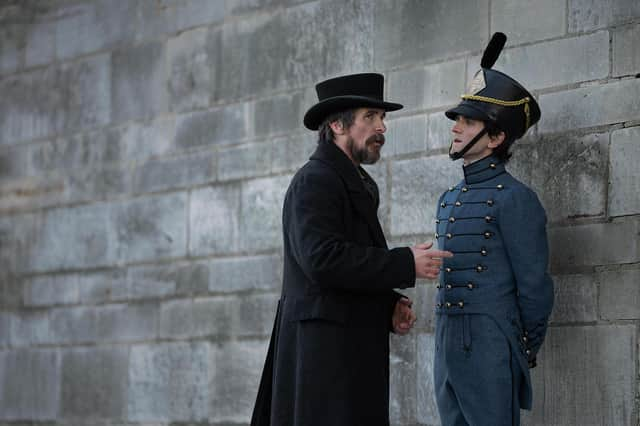Film reviews: The Pale Blue Eye | Corsage


The Pale Blue Eye (15) ***
Corsage (15) ****
Edgar Allan Poe invented the detective story with Murder in the Rue Morgue, but with The Pale Blue Eye, writer/director Scott Cooper (Crazy Heart) also riffs on Poe’s The Tell-Tale Heart, crafting a murder mystery that mixes details of the young Poe’s life with a plot reverse-engineered from some of Poe’s fiction in order to craft a kind of biopic-cum-origins story of the troubled American writer. Based on a 2003 novel by Louis Bayard, the 1830-set film stars Christian Bale as Augustus Landor, a retired constable called in to investigate a series of gory slayings at the nearby West Point military academy in upstate New York. Known for his pioneering use of forensic evidence, Landor is baffled by the murders – which involve young men being hanged and their hearts removed – but he also encounters Poe as a young cadet, whose eagerness to aid his investigation revitalises his sense of purpose. Played by Brit actor Harry Melling with a theatricality that’s appropriate for the era, but does take a little getting used to, Poe is overeager and smart, but a little disturbed too. His outcast status among the young elites of the school has cultivated a darkness within him that we’re meant to take as sign of his future path in life, one that’s also fuelled by possible occult practices within the academy that may or may not involve Lea (Lucy Boynton), a fellow cadet’s beguiling sister, upon whom Poe has formed a hopeless crush.
The film is built around the relationship Poe forms with Landor, whose reason and logic run headlong into the superstitions of the era, something that Cooper uses to turn the film into an appropriately macabre mystery in keeping with Poe’s later literary work. Though this sort of fictionalised biopic has become increasingly common in recent years – see this year’s Emily Brontë film Emily for another recent example – it’s still an intriguing way to do a Poe-style movie without trying to top or subvert all those old Roger Corman and Hammer adaptations. That said, there’s a self-serious quality to the film too that ensures it stops short of being the compelling serial killer thriller it could have been. Timothy Spall in particular overcooks his turn as the academy’s officious superintendent, and Cooper matches the chilly winter setting with coolly composed shots that keep us at too much of a distance. Bale, though, delivers another finely tuned performance of customary intensity and the pseudo father/son relationship he forms with Melling’s Poe gives rise to interesting revelations about both characters as the plot progresses. Gillian Anderson, Toby Jones, Robert Duvall and Charlotte Gainsbourg round out the classy supporting cast.
Advertisement
Hide AdLike Pablo Larraín’s recent Spencer and Sofia Coppola’s Marie Antoinette, Corsage turns the isolating life of a leading female royal into an anachronistic meditation on female celebrity, patriarchal oppression and the psychological damage both inflict. The royal in question is 19th century Hapsburg Empress Elizabeth of Austria, the despised wife of the unfaithful and reactionary Austro-Hungarian Emperor Franz Josef (Florian Teichtmeister). Phantom Thread’s Vicky Krieps takes the lead as Elizabeth, whose daily battle to fit into the waist-cinching corsage of the title symbolises the character’s struggle to conform to the repressive dictates of European royal life.
The disdain she routinely inspires, both within and outwith the court, is really a consequence of her allegiance to the Hungarian Count Andrássy (Tamás Lengyel), a more progressive member of the Hapsburg empire, whose attentions she encourages in one of the few acts of real defiance she allows herself. Mostly, though, she commits to the martyrdom of her position and Austrian director Marie Kreutzer – borrowing from Sofia Coppola’s playbook – augments the film with playfully melancholic cover versions of contemporary ballads (Kris Kristofferson’s Help Me Make it Through the Night, The Rolling Stones’ As Tears Go By) to intensify Elizabeth’s tragic status, reconfiguring the latter as a druggy downward spiral. But she takes intriguing creative leaps too by having Elizabeth encounter an early form of cinema, a scene that reinforces the extent to which any possible liberation at this time is relegated to the imagination. Accordingly, Krieps delivers a performance bubbling with quiet fury.
The Pale Blue Eye is on selected release from 23 December and streams on Netflix from 6 January; Corsage is on selected release from 26 December